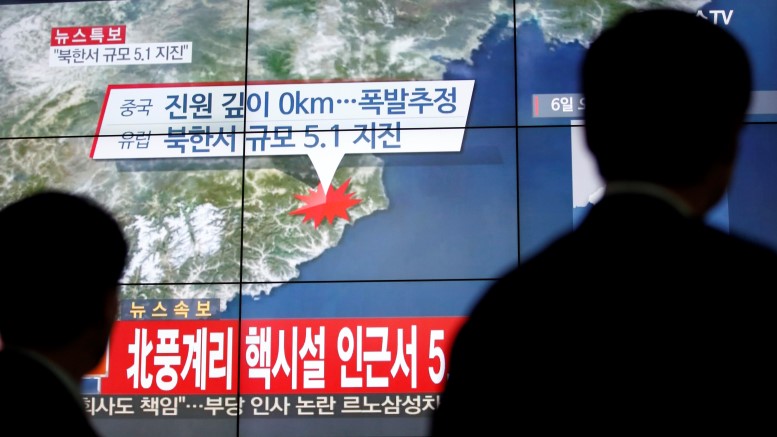Alwaght-North Korea on Friday said it conducted its fifth nuclear test, announcing it is now capable of mounting nuclear warheads on ballistic rockets.
The statement came just hours after a powerful explosion was reported near the country's secretive nuclear test site.
"The standardization of the nuclear warhead will enable the Democratic People's Republic of Korea, DPRK, [North Korea] to produce at will and as many as it wants a variety of smaller, lighter and diversified nuclear warheads of higher strike power," a statement from Pyongyang, posted on the website of the Korean Central News Agency, reads. South Korea’s Defense Ministry said that, "upon conducting an analysis, we came to the conclusion, that the North has carried out a nuclear test."
State media said the experiment, carried out at a secretive underground facility, saw a nuclear warhead that could be “mounted on strategic ballistic rockets” was detonated.
In January this year, North Korea carried out its fourth nuclear test at the Punggye-ri Nuclear Test Site, which was registered as a 5.1-magnitude tremor by seismological organizations.
The latest test appears to be the most powerful one in the history of North Korea’s nuclear program, South Korea’s Defense Ministry said, adding that the yield of the previous January test was about 6 kilotons. Earlier tests were conducted in 2013 (6-9 kilotons), 2009 (2-4 kilotons) and 2006 (1 kiloton).
Fresh sanctions were the expected outcome of an emergency meeting called by the United Nations Security Council but analysts were quick to point out that such measures had done little in the past to quell North Korea’s nuclear ambitions.
Nuclear Tests to counter US nuclear “blackmail”
North Korea continues to justify its nuclear weapons program as a deterrent against US nuclear “blackmail."
The ruling party newspaper says Pyongyang will not to submit to US nuclear “blackmail”, and described the South’s President Park Geun-Hye as a “dirty prostitute” for working with US forces.
“Gone are the days never to return when the US could make a unilateral nuclear blackmail against the DPRK,” Rodong Sinmun said, using the country’s official name. “The US is exasperated by the strong military steps being taken by the DPRK in a phased way.”
North Korean nuclear test has endangered the security of the Korean Peninsula and is bound to have immense regional and international consequences.
Japan, South Korea have expressed deep concern over the nuclear test. The South Korean president had to cut short her visit to Laos and return to Seoul following the test while reiterating that the only way to confront this situation is enhancing close ties with the United States.
The US has been blamed for the bellicose nature of Pyongyang and its subsequent nuclear weapons tests. In August, large-scale joint military drills conducted by South Korea and the United States jeopardized peace and stability in Northeast Asia.
Tens of thousands of South Korean and U.S. troops took part in the two-week Ulchi Freedom Guardian exercises, five months after the two countries launched the Key Resolve and Foal Eagle exercises.
Although Seoul and Washington claimed that their drills were defensive, the exercises that simulated an all-out attack by the Democratic People's Republic of Korea (DPRK) made Pyongyang more aggressive and worsened the already fragile and unstable situation on the Korean Peninsula.
Recently, the US decided to deploy cutting-edge nuclear-capable bombers to its base in Guam, located in the Western Pacific, and announced the deployment of THAAD missile systems to South Korea, causing even more heated and angry rhetoric from the North.
US Escalating Tensions to Counter China
According to a 2020 strategic document, the US has vowed to pay special attention to the region bordering China and this explains recent moves by Washington to escalate military tensions in the South China Sea.
The US views China as its global rival and has increased its military presence in the region in a bid to stop Beijing’s expanding power and to get closer to Japan, Taiwan and South Korea. The East Asia region is a major pillar of the global economy which is set to replace the US and other Western economies as a leading economic zone.
Actions by the US and its allies have infuriated the North Korean leadership and Washington has no intention of holding talks with Pyongyang based on mutual respect.
If the intensity of tensions in the Korean peninsula persists, the world will witness a new wave of insecurity and a nuclear arms race in the region and no doubt the US will use the worsening situation as a pretext to extend its hegemony in the region and spread instability to China. Washington’s belligerent policies in the region will lead to a vicious circle of violence for violence.



























